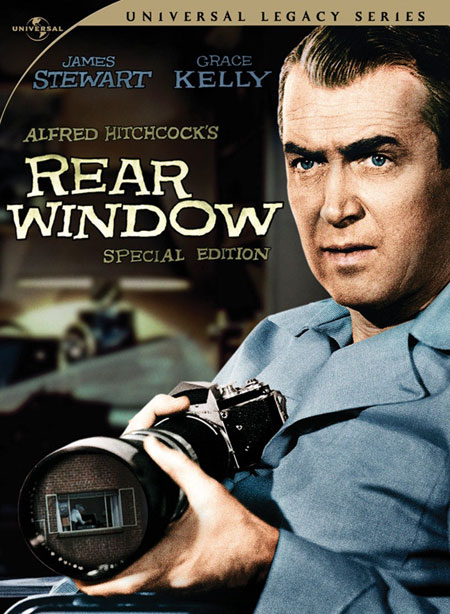The Peeping Tom protagonist of Alfred Hitchcock’s Rear Window looks around the neighbourhood with boredom—he has nothing better to do while recuperating from a broken leg.
As the film opens, it gives a lethargic, worn out feel to itself with an advertisement on the radio for men over 40. As the voice fades, we get to see the houses, the protagonist, and a messy room, much in need of immediate housekeeping. The introductory set-up is devoid of the usual atmospheric setting for a “thriller”—one doesn’t even get a ‘noir’-type feel.

Rear Window film poster.
For the first 30 minutes or so—a rather long time for character development—one feels that there is hardly any ‘meaty’ action taking place. The words of wisdom from the protagonist’s housekeeper, the banal conversation of the employer and the protagonist, the inferiority-complex laden verbal exchanges of the couple, all seem to be an unusual start for a film which is referred to as a thriller. The viewer gets to meet the typical rich woman—someone who has the world at her feet—but deep within her, she yearns for companionship. A die-hard thriller enthusiast, by now, would be anxious to see some sign of prospective thrill—a weapon, wads of money, plans to murder someone—but he has to wait a while before he first sees an indication of something eventful.
Early on in the film, the protagonist, L. B. “Jeff” Jeffries, gets a call from his employer. They exchange a few words about how an assignment meant for Jeff has been delegated to someone else. The usual employer’s demeanour—self-righteousness while being manipulative—is evident. Thus, Hitchcock introduces us into a thriller with the banal regularities of a life-nagging employer, chattering nurse, insecure girlfriend, and loud neighbours. Little do we realise how seamless the transition, from a dramatic outset to a thriller conclusion, would be. Unlike Strangers on a Train, the ‘villain’ here is less loquacious, but just as cunning. The reluctance of other characters to accept any vicious designs that the villain has also contributes to the difference in treatment of one film from the other. One wouldn’t expect Hitchcock to have left this to chance. At the same time, an initial viewing of the films doesn’t make it look deliberate.
Listening carefully to the conversation between the protagonist and his girlfriend draws attention to the chasm between the two. The protagonist is the carefree man’s archetype, who claims that he only has a week’s salary in his account. Employed as a photographer, he has travelled to dangerous places, eaten strange food, and endured unexpected hardship. His inhibitions in accepting a woman who is exactly opposite in tastes and temperament is not surprising. What does seem surprising, though, is the existence of the relationship. The woman, despite seeing the protagonist’s unwillingness to change, doesn’t give up. Hence, in what is supposed to be an outright thriller film, a scene of the woman having ordered expensive food and champagne is filmed—perhaps it reflects the inability of the woman to repress her motherly instincts. Why else would a woman treat a man, who is defiant of his feelings for her, purely for pragmatic reasons, such as compatibility?
A brief note on the Peeping Tom mentality, and the abundantly discussed moral issues that the film raises—never mind the perversion, the neigbourhood itself is too noisy to go unnoticed. That the protagonist takes it a step further by involving binoculars and camera doesn’t dilute the degree of people’s want to be noticed. The dancing girl, with well-rehearsed, flawless movements, keeps her windows open—for what? To be ignored? All windows are almost always open. An argument could be made that without the protagonist having visual access to the lives of others, the film would have been incomplete. But can’t that be interpreted as the need of the neighbours to be noticed?
The film ends, too, in a manner uncharacteristic of a thriller, with the differences between Jeff and his girlfriend, Lisa, remaining somewhat at the same level. She is about to read a travel magazine, but as soon as he is asleep, picks up a fashion magazine instead. There are no change in fortunes, no exposés—just an expression of ambivalence over the grim fortune of the relationship that the protagonist and his girlfriend commit to.








